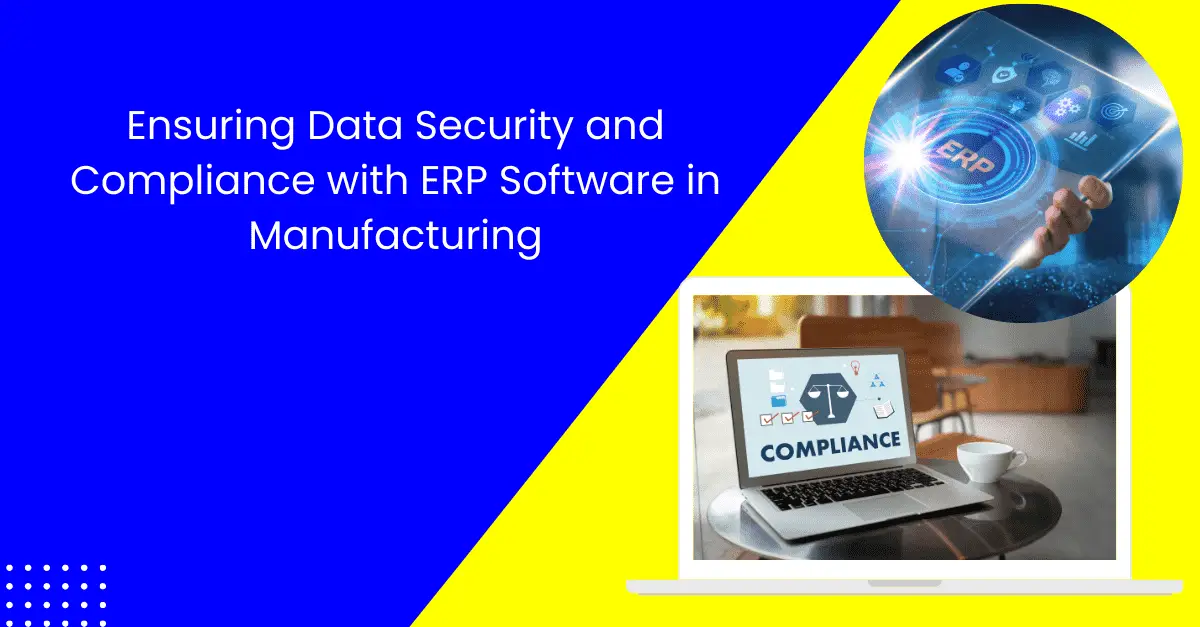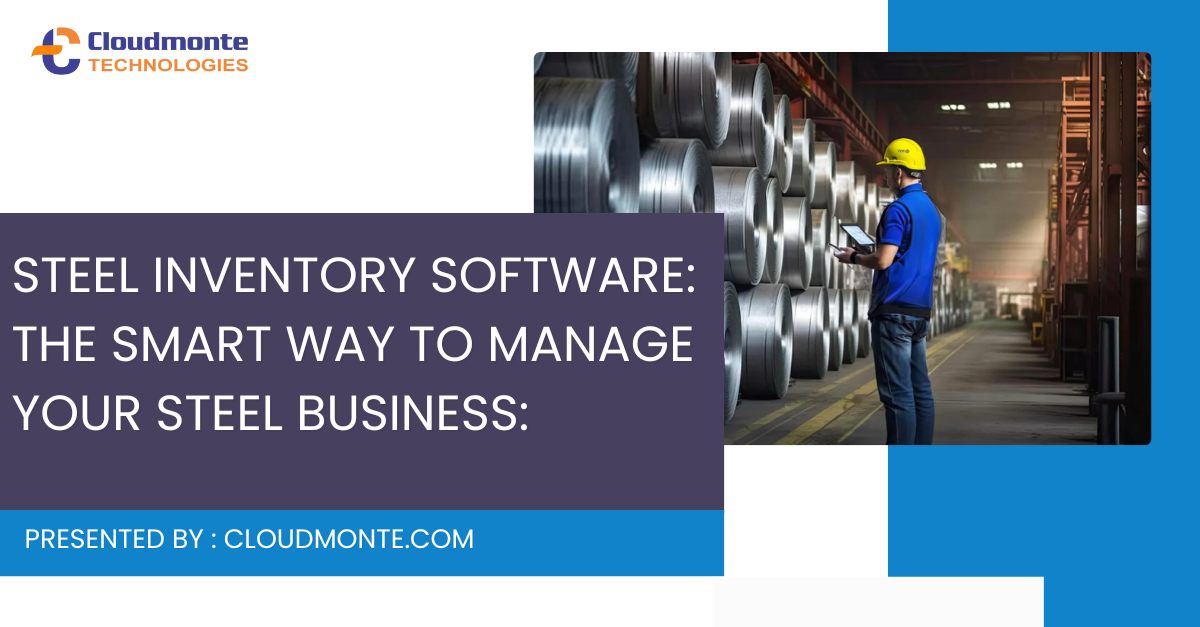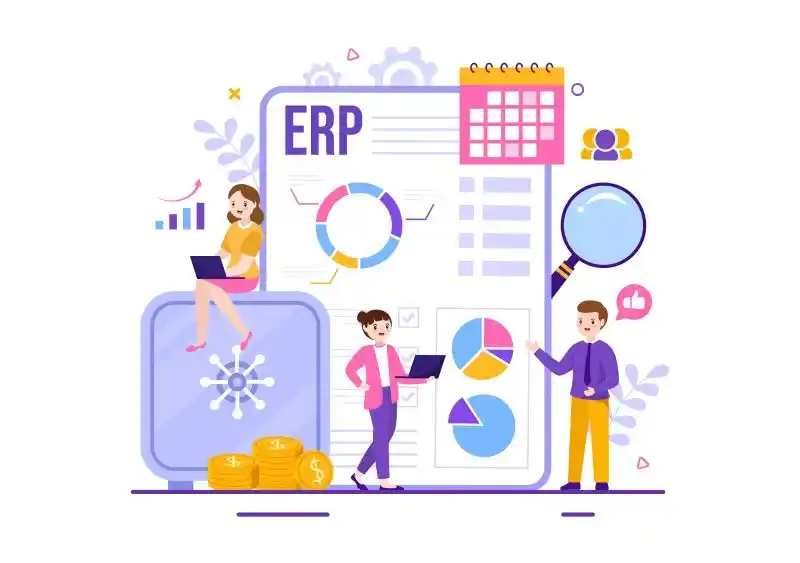Ensuring Data Security and Compliance with ERP Software for Manufacturing
The most crucial things are data security standards and regulatory compliance. We understand how important it is to ensure that your manufacturing company system’s
ERP software for manufacturing business meets all relevant security standards and regulatory regulations.
Data security is the process of guarding against illegal access, corruption, alteration, and theft of digital data at every stage of its lifecycle, including ERP software for manufacturing companies. By putting rules, processes, and technologies in place to make sure that data is safeguarded and accessed only when necessary and with the proper authority, data security works to respect these principles.
When properly implemented, data security guards against internal risks like hostile personnel and inadvertent data disclosure, as well as cyberattacks. Data security also helps minimize data exposure and follow the principle of least privilege by giving access only after the request can be confirmed, in line with the many regulatory compliance requirements that are coming into force.
We will examine the important link between
data security and compliance in this article, along with tips for successfully navigating security requirements and laws.
Importance of Data Security in ERP System?
Data security in Erp software, manufacturing data security software
From inventory management and quality control to customer orders and delivery dates, manufacturing handles a lot of data. While essential for daily operations, this
manufacturing data security software safeguards sensitive data against theft, tampering, and illegal access. Manufacturing data breaches may damage reputation, profits, and legal status.
- Protects private data from hacking or illegal access.
- Keeps bank records, client information, and proprietary data safe.
- Preserves compliance, trust, and legal obligations.
- Prevents money loss and reputational harm from occurring.
- Guarantees vital company data’s availability, confidentiality, and integrity.
- Makes adherence to industry norms and laws easier.
- Backs up staff training, audits, and upgrades for efficient security protocols.
What Regulatory Compliances are related to ERP Software?
ERP systems manage sensitive data, such as customer and financial records and confidential company information. Compliance is the observation of security policies and procedures designed to protect this data and lessen risks. Regulations like GDPR, HIPAA, PCI-DSS, and SOX have compliance requirements particular to their industries and regions.

How will ERP software meet with compliance in business?
Recognize Relevant rules: Determine whether rules are relevant to your sector and region. Learn about their unique needs and make sure your ERP system complies with them.
Put Security Controls in Place: Give your ERP system strong security measures. To safeguard sensitive data, this comprises firewalls, intrusion detection systems, frequent patching, encryption, and access restrictions.
Data Privacy Measures: Put in place procedures to protect personal information, such as permission management, data anonymization, and pseudonymization. Make sure you have policies in place to deal with requests for access by data subjects and data breaches efficiently.
Document rules and processes: Assert your organization’s commitment to compliance by creating and documenting security rules and processes. Programs for staff training, incident response plans, and data management rules are all included in this.
Keep Audit Trails: Set up audit trails in your ERP system to keep tabs on user actions, system modifications, and data access. This facilitates forensic investigation, monitoring, and aids in proving compliance with audit requirements.
Security standards protect sensitive data, reduce risks, and meet legal obligations. Make sure your ERP system meets legal criteria to preserve your firm and stakeholder trust. Maintaining a secure and compliant ERP system includes keeping up with new regulations, implementing effective security measures, and tracking compliance.
What are the risk factors to your business data?
1- Cybersecurity risks: As new technologies are used in production, cybersecurity becomes more important. The manufacturing sector must strengthen its
cyber risk management in manufacturing business and pay more attention to safeguarding private information belonging to customers and employees, IT assets that control the supply chain, and other industry-related procedures.
The most serious concerns facing organizations today are cybersecurity vulnerabilities and data breaches because hackers will seize any chance to use cyberattacks to disrupt operations and create downtime.
2- Supply chain interruption: Manufacturers that have disruptions in their supply chain that prevent them from meeting delivery deadlines run a higher risk of incurring sales and profit losses in the millions, endangering their company and image.
Manufacturers should identify important suppliers and ascertain how supply chain interruptions can impact the production of final goods to counter this danger by evaluating their supply chain risks.
3- Product recalls: Product recalls occur when a producer is forced to retrieve items that have already been sold due to a flaw that might endanger users or give them reason for complaint. Production, manufacturing procedures, distribution, and the company’s supply chain may all be negatively impacted by recalls. They may also put the company at risk of expensive legal action and damage to its reputation.
4- Third-Party Vendors: A third-party vendor may put manufacturers at risk in many ways. For instance, because the manufacturer is accountable for any wrongdoing or carelessness while a vendor acts on the company’s behalf, subpar vendor practices may provide a regulatory risk. Thus, it is essential to have a system of vendor risk management and security efforts that deal with cyber risk.
5- Labor concerns: In the furthest reaches of an international supply chain, forced labor and human trafficking may occur, with repercussions that eventually reach the producer selling products to customers. Damage to your reputation, difficulties finding alternative suppliers while severing relations with violating ones, and the expense of navigating regulatory action are possible outcomes.
Nearer to home, the area of job safety is strictly controlled. Companies have compliance requirements to fulfill regarding organized labor, wage and hour breaches, and workplace safety.
Benefits of Implementing ERP Software for Manufacturing Industry
Importance of managing risks in manufacturing:
The industrial sector needs proactive risk management for several reasons.
Enhanced Safety: Good risk management reduces workplace accidents and ensures employee safety, which promotes a positive work environment.
Operational Efficiency: Lowering risks leads to lower operating costs, more effective operations, and increased efficiency all around.
Savings: By identifying and reducing risks, manufacturing companies may avoid costly recalls and disruptions. A robust risk management process may be implemented so that issues are dealt with before they happen.
How ERP Software Helps Manufacturing Businesses with Compliances?
Manufacturing companies can easily simplify compliance operations by using an ERP system.
- Automation: By automating regulatory compliance procedures, ERP systems minimize human mistakes and effort.
- Centralized Data: Manufacturing ERPs facilitate the tracking and management of compliance-related data by centralizing data.
- Real-time Monitoring: Businesses can keep track of compliance status and quickly handle concerns using real-time monitoring tools.
- Customization: Manufacturing ERPs may be tailored to comply with certain industry rules, guaranteeing requirements are met.
- Audit Trails: ERP systems provide thorough audit trials that make regulatory compliance and compliance audits easier to accomplish.
- Document Management: ERPs with document management tools make it easier to store and retrieve documents pertaining to compliance.
- Training Modules: To promote a compliance culture among staff members, some ERP systems include training modules that teach them about compliance obligations.
- Risk management: By offering insights into possible non-compliance areas, ERPs assist in identifying and reducing compliance risks.
- Reporting Tools: Comprehensive ERP systems with strong reporting capabilities provide compliance reports that make regulatory filings and compliance evaluations easier.
- Integration: By integrating with third-party compliance software, compliance capabilities are further improved, and all regulatory needs are covered in detail.
Conclusion:
ERP for the manufacturing industry will help in data storage and access need a strong technological foundation that lets you implement internal controls and track their effectiveness over time. Selecting solutions that can simplify audit compliance in conjunction with your entire ERP data security is crucial given the additional weight of compliance standards.
A complete security platform is offered by Cloudmonte Technologies, the
best manufacturing ERP software company to manage user access to data, stop policy violations, restrict the exposure of sensitive data, and identify and address threats. Enterprises can proactively minimize ERP risks and analyze user behavior to identify attacks and prevent breaches when combined with our monitoring and logging capabilities.





